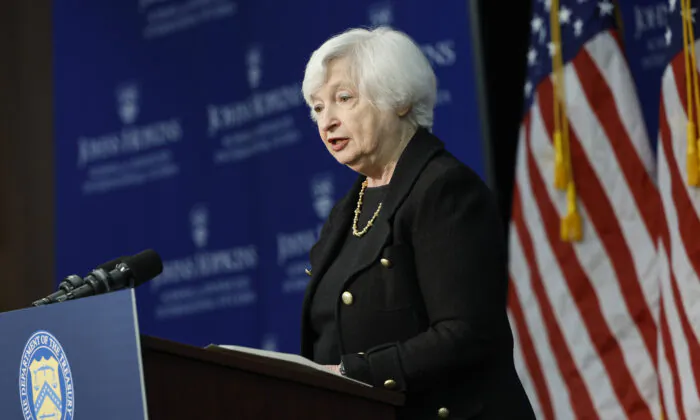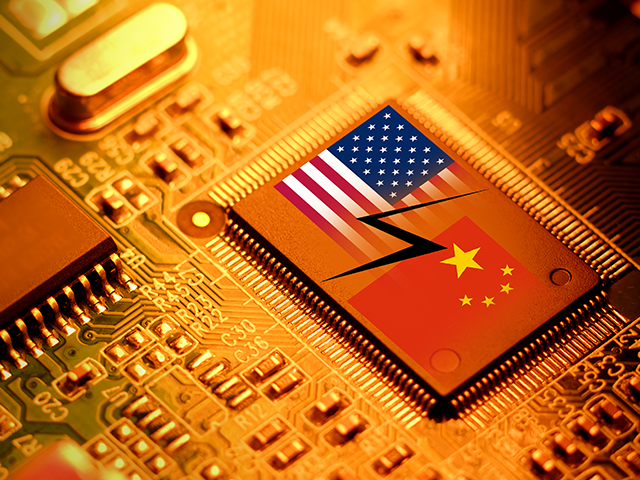Recently, a prominent holder of a high U.S. office and an eminent American academic and historical biographer proposed similar methods for resolving the war in Ukraine.
Treasury Secretary Janet Yellen, even as more capable and articulate spokespeople on foreign and strategic matters wouldn’t opine on the subject of war in Central Europe at all, came closer than the administration yet has to a peace plan for Ukraine.
On April 20, she implied that the United States should invite China to take a leadership role in convincing its junior ally Russia, now clinging desperately to China’s geopolitical coattails like a person whose legs are asleep, to be more tractable in its peace terms. Yellen suggested that this proposed policy for China could be incentivized by the United States improving economic relations with China.
On April 13, speaking in Toronto, Stephen Kotkin, distinguished Stanford academic and authoritative biographer of Joseph Stalin, made a similar proposal in the belief that the Chinese would be happy to perform this service in order to facilitate the sale to China of higher technology than it now possesses.
This is almost the worst possible course for seeking an end to the Ukraine war, except for the administration’s previous policy of tiresomely repeating that Russian President Vladimir Putin is a war criminal and that Ukraine must be restored in all of its territory, including Crimea and adjoining places seized by Russia in 2014.
The three principal strategic objectives of the United States, the Western Alliance, and the allies of the West in the Far East should be the development and implementation of a modified containment policy in respect of China; the enticement, with no sacrifice of its own strategic interest, of Russia out of the potentially strangling embrace of China and to gradually bring Russia back to its natural vocation as a Western rather than an Eastern country; and to assure that the West’s great and bloodless victory in the Cold War isn’t squandered by permitting Russia to reconquer Ukraine and that Ukraine, possibly with slightly reduced borders, is integrated into the West.
Everyone agrees that the greatest strategic threat to the West is China; it would be difficult to think of a proposal that more completely fails as a response to that threat than to use whatever dwindling influence the Biden administration retains in these matters to escalate the intimacy of Beijing and Moscow and usher China as a major geopolitical influence into the heart of Europe. If it were necessary, it would be expedient instead to bribe China with high technology to avoid the spread of its influence into Europe.
Apart from anything else, peace in Ukraine appears to be the last thing the Chinese regime seeks. The Chinese leaders are evidently delighted to have Russia beseeching Chinese assistance. Without having to redeploy a battalion or spend a ruble, China has found the largest country in the world rapping meekly on its back door with cupped hands, like a homeless drifter. China is well served by having the West deluging Ukraine with weapons and depleting its ammunition stocks in a war that’s thousands of miles from China’s borders.
The increasingly aggressive stance of China leaves all of its neighbors with the increasingly urgent obligation to choose between the appeasement of the People’s Republic or association with those who—with full respect for China’s status as an immense, ancient, and powerful country—share a determination to prevent its imperialistic aggrandizement in the assertion of a demeaning suzerainty over its neighbors.
Japan, South Korea, Taiwan, India, Australia, New Zealand, the Philippines, Vietnam, and probably Indonesia are all seeking closer association and the comfort of support from the United States in the implementation of a respectful but firm regional balance of power and of the correlation of forces between China and her satellite, North Korea, and the surrounding countries across China’s southern shores and borders. One of the surest methods of demoralizing the advocates of that enterprise would be to reinforce Chinese domination of Russia and invite the mighty dragon into the heart of Europe.
In the Far East and South Asia, Western and specifically American interests are best served not by a decoupling of the U.S. and Chinese economies, which Yellen rightly opposes, but by a gradual readjustment of that relationship to eliminate its chronic deficit in China’s favor and end U.S. reliance on China for any strategic aspect of its supply chain.
In Europe, the first Western priority is to preserve the fruits of the satisfactory outcome of the Cold War. The disintegration of the Soviet Union and the demise of international communism, as we had known it, were consummated in the secession from Moscow’s control of all of the republics of the former USSR except Russia itself. The principal of these was Ukraine, and if Russia were able to reabsorb that country by force, it would be a bone-crushing moral defeat for democracy, a substantial reversal of our success in the Cold War, and confirmation for all who would hope for it that the West is in decline and lacks the will and the means to defend itself. This is the fallacy of the paleoconservative isolationists advocating a Ukraine policy of cut and run.
Mao Zedong and Zhou Enlai informed President Richard Nixon and his national security adviser, Henry Kissinger, in 1972 that it would be 100 years before China considered Taiwan a major preoccupation and that it was best in the meantime to leave it on the understanding that the West accepted the principle of a single China and the People’s Republic undertook not to attempt reunification by force.
The recent apparent enfeeblement of the United States, as illustrated by the debacle in Afghanistan and the failed Obama–Biden appeasement of Iran, appears to have encouraged Beijing to advance the Taiwan timetable outlined in 1972.
It must be said that the one visible positive element of the Biden administration’s foreign policy to date is the insertion in the National Defense Authorization Act of the clear commitment, which mercifully hasn’t been walked back by the president’s entourage, that in the event of a direct Chinese attack on Taiwan, the United States would come actively to Taiwan’s defense. In the Far East, there’s at least the beginning of a modified containment policy.
The road to peace in Ukraine isn’t difficult to find and has nothing to do with China. Putin has stated his terms: recognition of the territories he purports to have annexed. We must do what we reasonably can to assist Ukraine in taking back some of that territory in its long-awaited spring offensive and then to offer those borders to Russia, not in a Korea-like ceasefire as proposed last week but in exchange for unequivocal Russian, as well as NATO, guarantees of Ukrainian sovereignty within its revised borders and not the frivolous guarantees that we gave Ukraine in the past that we’ve all ignored.
The West certainly possesses the ability to persuade Ukrainian acceptance of these terms: 80 percent of the sovereignty loaf for the Ukrainians and 20 percent of comparative crumbs for Russia, but enough for Putin to avoid complete humiliation. There should be freedom of movement for all Ukrainians to live in Ukraine and Russia and a massive economic recovery package for Ukraine. Then we can get on with containing China where it belongs and bringing Russia into concert with the West, where it belongs.
https://www.theepochtimes.com/inviting-china-into-ukraine-conflict-would-be-a-grave-mistake-for-the-west-2_5218619.html?src_tmp=POPULAR+OPINION_5_Inviting+China+Into+&src_cat=article_widget&src_cmp=article_widget_POPULAR+OPINION


No comments:
Post a Comment